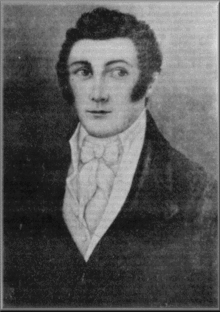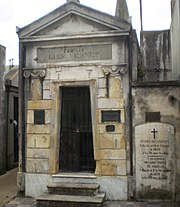Undid revision 435296518 by Langus-TxT (talk) per talk |
Langus-TxT (talk | contribs) rv to the original state before my first edit |
||
| Line 27: | Line 27: | ||
}} |
}} |
||
Luis Vernet (born Louis Vernet in 1791 - died in 1871) was a merchant from Hamburg of Huguenot descent. |
|||
'''Luis Vernet''' (born '''Louis Vernet''' in 1791 - died in 1871) was a merchant from [[Hamburg]] of [[Huguenot]] descent. Vernet established a settlement on East Falkland in 1828, after first seeking approval from both the British and Argentine authorities. As such, Vernet is a controversial figure in the history of the Falkland Islands sovereignty dispute. On the one hand he is considered as a national hero in Argentina as he was proclaimed Governor of the Islands by the Republic of Buenos Aires in 1829, on the other he is perceived as an unpatriotic merchant who acted in his own interest and made a pact with with the British. The US Government accused Vernet of piracy, whilst the British regard him as an entrepeneur who began the opening up of the Falkland Islands economy. |
|||
In the Falklands, Mount Vernet, on [[East Falkland]], is named after him. |
|||
==Biography== |
==Biography== |
||
Revision as of 21:50, 20 June 2011
Luis María Vernet | |
|---|---|
 | |
| Born | Louis Vernet March 6, 1791 |
| Died | January 7, 1871 (aged 79) |
| Resting place | La Recoleta Cemetery |
| Citizenship | Argentine |
| Known for | Being the first Argentine appointed as Governor of Puerto Luis by the Government of Buenos Aires |
| Title | Governor of Puerto Luis |
| Term | 1829-1831 |
| Successor | Juan Esteban Mestivier |
Luis Vernet (born Louis Vernet in 1791 - died in 1871) was a merchant from Hamburg of Huguenot descent.
Biography
Family background
His exact birthplace is unclear as some sources call him a native of Hamburg,[1] while others refer to his name as French born.[2] Vernet was in fact born in Hamburg but later claimed a French birthplace in his effort to have the French Government intercede with the British Government on his behalf.
Elias Luis Vernet (Vernet and Louis Elie) was born on 6 March 1791 in Hamburg. His ancestors were Huguenots, probably from Avignon, who settled first in Belgium and then Hamburg. His parents were the tobacco and tea merchant Jacques Vernet (* 1730, † 1813) Maria Vernet and his brothers were Peter Alexander, Emilio and Federico.
At 14 years old, in 1805, he was appointed by his father to a trading company and sent to Philadelphia. There he became a merchant travelling to Portugal, Brazil and Hamburg.
Emigration to South America
The U.S. government sent a diplomatic Commission sent to the newly independent United Provinces of Río de la Plata, Luis Vernet took passage in the frigate USS Congress, arriving in Montevideo in February 1818 (whilst is was a Brazillian possession) and on to Buenos Aires. He remained in Buenos Aires there and organized a trading company with the port of Hamburg.
Together with the Montevideo-based Conrado Rücker († 1866, Hamburg), he ran a trading company until 1821 . Rücker was also his best man when he on 17 August 1819 he wed María Saez Pérez (* 1800; † 1858) from Montevideo . With her he had seven children: Luis Emilio, Luisa, Sofia, Malvina (* 1830, † 1924), Gustavo, Carlos Federico.
Later he established an Estancia about 100 km south of Buenos Aires on the Río Salado, where he captured and slaughtered wild cattle. At this stage the represented the border of the colonised areas.
Falkland Islands Venture
Vernet was the first Argentine appointed as Governor of Puerto Luis by the Government of Buenos Aires (his appointment was in the name of the Republic of Buenos Aires). Vernet was owed money by the Argentine Government and the settlement in the Falkland Islands was offered in partial restitution of that debt.
A proclamation naming Vernet as Governor was issued by the Government in Buenos Aires in 1829. The proclamation followed his petition to the Government to provide a warship to police the settlement. That request was refused and instead the proclamation issued giving Vernet the authority to act with his own means. Vernet was anxious to establish the colony quickly as he was promised that it would be free from taxation if it could be established within 3 years.
The appointment of Vernet was challenged by the British consul in Buenos Aires, who restated the previous British claim to the Islands. Vernet had sought British permission before landing on the Falkland Islands (in 1826 and again in 1828) and agreed to provide regular reports to the British consulate. In response to the announcement of his appointment as Governor, Vernet stressed to the British that his interests were purely commercial.
Vernet arrived in Puerto Soledad in 1829 and reverted to the use of the original French name as Puerto Luis. The settlement was only established in 1828 after several abortive attempts and following the abandonment of the previous Spanish and British colonies in the Falklands in 1811 and 1776 respectively (although both nations left behind declarations of their continued sovereignty).
Vernet was granted a monopoly on seal hunting and one of his first acts was to curb seal hunting on the Islands by others, to conserve the seal population for his own dealings. In 1831, Vernet seized the American ship, Harriet, for breaking his restrictions on seal hunting. Property on board the ship was seized and the captain was returned to Buenos Aires to stand trial. Vernet also returned for the trial. As a result, in 1831 the USS Lexington made a raid into the islands. On January 1833 a British task force gained control of the Falklands Islands, ending the influence of Buenos Aires over them.
Post Falklands-Era
Vernet never set foot in the Falklands again. Recognising that Vernet had British permission to be in the islands, the settlement in the Falklands was encouraged to continue.[3] Vernet's deputy, Matthew Brisbane, returned in March 1833 and endeavoured to resurrect the settlement but later that year was murdered alongside senior members of the settlement by disgruntled Gauchos.[4]
Vernet later attempted to return to the islands but was denied access by the British who labelled him a trespasser and reneged on promises made by Captain Onslow in 1833. Nevertheless Vernet continued to influence the development of the Falkland Islands. He sold part of his holdings in the islands to British merchant G.T. Whittington,[5] who formed the Falkland Islands Commercial Fishery and Agricultural Association. This organisation was a key factor in persuading the British Government to establish a colony in the islands, rather than a military base. He provided Samuel Lafone, a businessman key to the formation of the Falkland Islands Company, with maps of the island and knowledge of the potential of the feral cattle population of the islands.
Legacy

He returned to the Argentine mainland, and was later credited with the discovery of a preservative treatment for leather; the process, known in Argentina as vernetizar, permitted the rapid growth of leather exports to Europe and elsewhere.[6]
Luis Vernet died in San Isidro, Buenos Aires, in 1871, and was interred in La Recoleta Cemetery.
References
- ^ Encyclopædia Americana
- ^ Virginia Gamba-Stonehouse at www.falkland.info
- ^ Fitzroy, R., VOYAGES OF THE ADVENTURE AND BEAGLE. VOLUME II., Accessed 2007-10-02
- ^ A brief history of the Falkland Islands Part 3 - Louis Vernet: The Great Entrepreneur, Accessed 2007-07-19
- ^ Islas del Atlántico Sur, Islas Malvinas, Historia, Ocupación Inglesa: Port Stanley, Accessed 2007-10-02
- ^ Historical Dictionary of Argentina London: Scarecrow Press, 1978.